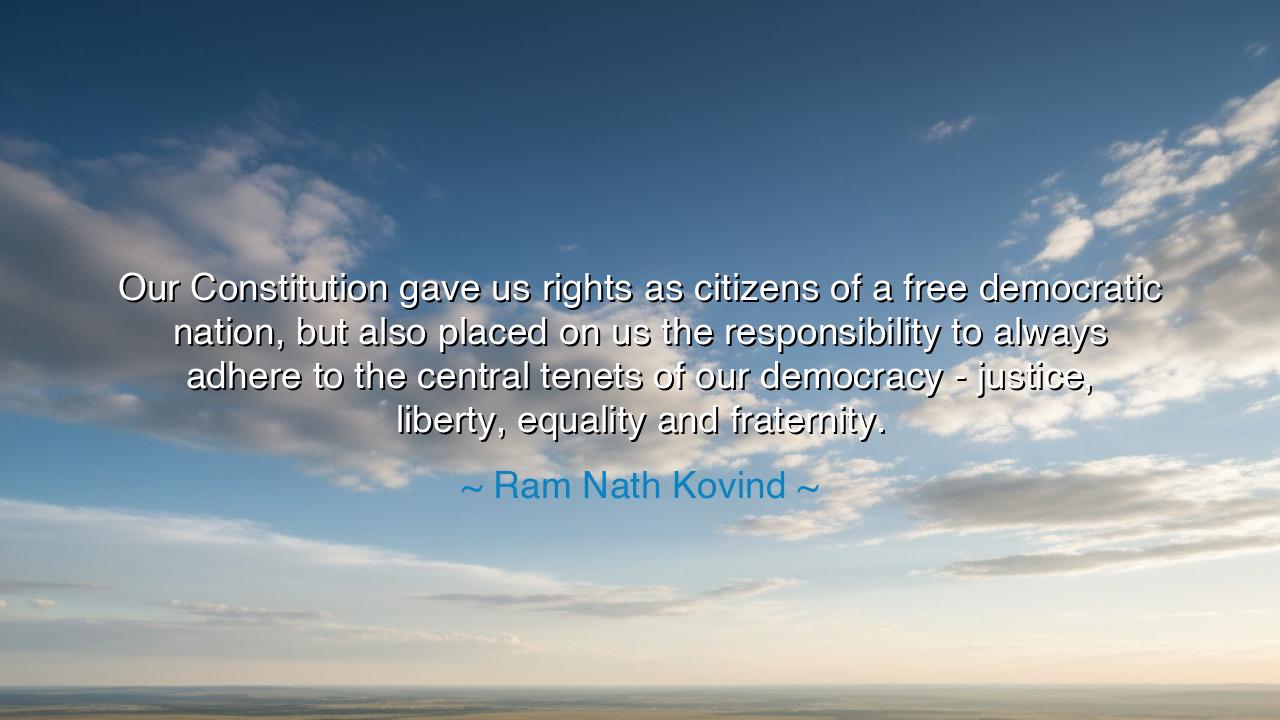
Our Constitution gave us rights as citizens of a free democratic
Our Constitution gave us rights as citizens of a free democratic nation, but also placed on us the responsibility to always adhere to the central tenets of our democracy - justice, liberty, equality and fraternity.






“Our Constitution gave us rights as citizens of a free democratic nation, but also placed on us the responsibility to always adhere to the central tenets of our democracy – justice, liberty, equality, and fraternity.” — Thus spoke Ram Nath Kovind, the fourteenth President of India, whose words echo like a solemn vow from the heart of a civilization reborn through freedom. His message is not merely a reminder of legal principles, but a moral summons to every citizen: that rights without responsibility are hollow, and that freedom without virtue becomes its own undoing. In this sentence lies the eternal balance upon which all republics stand — the harmony between the gifts we inherit and the duties we must uphold.
To understand the meaning of this quote, we must journey to the very soul of India’s Constitution, that sacred document born from struggle, sacrifice, and vision. It was not crafted in comfort, but in the shadow of oppression; not written in haste, but in hope. The framers of this great charter — guided by the wisdom of Dr. B.R. Ambedkar and inspired by the spirit of Mahatma Gandhi — sought to build not only a nation of laws, but a community of conscience. They granted the people rights — to speak, to think, to live with dignity — but alongside these, they placed the sacred duty to preserve justice, liberty, equality, and fraternity, the four pillars upon which the Indian democracy rests.
Justice — moral and social, not merely legal — is the first and greatest of these tenets. Kovind’s words remind us that freedom cannot flourish in a land where injustice still breathes. To fight for justice is to keep democracy alive. Consider the life of B.R. Ambedkar himself: born into oppression, yet he rose through learning and courage to become the architect of equality. He knew that laws alone could not destroy discrimination unless citizens themselves embraced justice as a way of life. Thus, every generation must renew this oath — to stand against wrong, to protect the weak, and to remember that justice is the highest expression of freedom.
Next comes liberty — not the license to do whatever one pleases, but the freedom to think, believe, and choose without fear. Kovind’s reminder speaks especially to an age when liberty is often mistaken for self-interest. The ancients taught that true freedom comes not from desire, but from discipline. Like a river bounded by its banks, liberty gains strength through restraint. The people of India won their independence through immense sacrifice; to misuse it through division, hatred, or neglect is to betray those who bled for it. To guard liberty, therefore, is to live with respect — for others’ faiths, voices, and dreams.
Equality, too, stands at the heart of Kovind’s message. For no democracy can endure if its citizens are divided by privilege or prejudice. The Constitution did not merely promise equality before law; it demanded equality in spirit — the recognition that every human being carries the same divine spark. Yet, as history shows, this is the hardest principle to uphold. Savitribai Phule, the pioneer of women’s education, defied the chains of caste and gender to bring learning to the oppressed. She did not wait for governments to act; she embodied equality through service. Her example reminds us that equality is not an idea to admire, but a duty to practice — in our schools, our homes, and our hearts.
And then comes fraternity — that ancient virtue which binds all others together. Without fraternity, justice turns to vengeance, liberty to arrogance, equality to envy. Fraternity is the soul’s acknowledgment that we are one people, many in form but united in destiny. Kovind’s words are a call to nurture this brotherhood, especially in a world fractured by suspicion and division. It is fraternity that transforms a crowd into a nation — that teaches us to see in another’s joy our own, and in another’s pain our duty.
Thus, O listener, let the wisdom of Ram Nath Kovind be your guide: rights are not gifts to be consumed, but trusts to be honored. The Constitution is not a shield for selfishness, but a mirror of our collective conscience. To live under its protection is to carry its spirit within — to uphold justice in your dealings, liberty in your thought, equality in your conduct, and fraternity in your heart. For democracy, like faith, survives only when lived daily by its believers.
Therefore, remember this: the strength of a nation lies not in its armies or its riches, but in the character of its citizens. Each act of fairness, each defense of another’s freedom, each gesture of compassion strengthens the invisible threads that hold the Republic together. As Kovind reminds us, our rights make us free, but our responsibilities make us worthy of that freedom. And when justice, liberty, equality, and fraternity dwell not only in law but in life, the dream of the Constitution — the dream of a true democracy — shall live forever.






AAdministratorAdministrator
Welcome, honored guests. Please leave a comment, we will respond soon